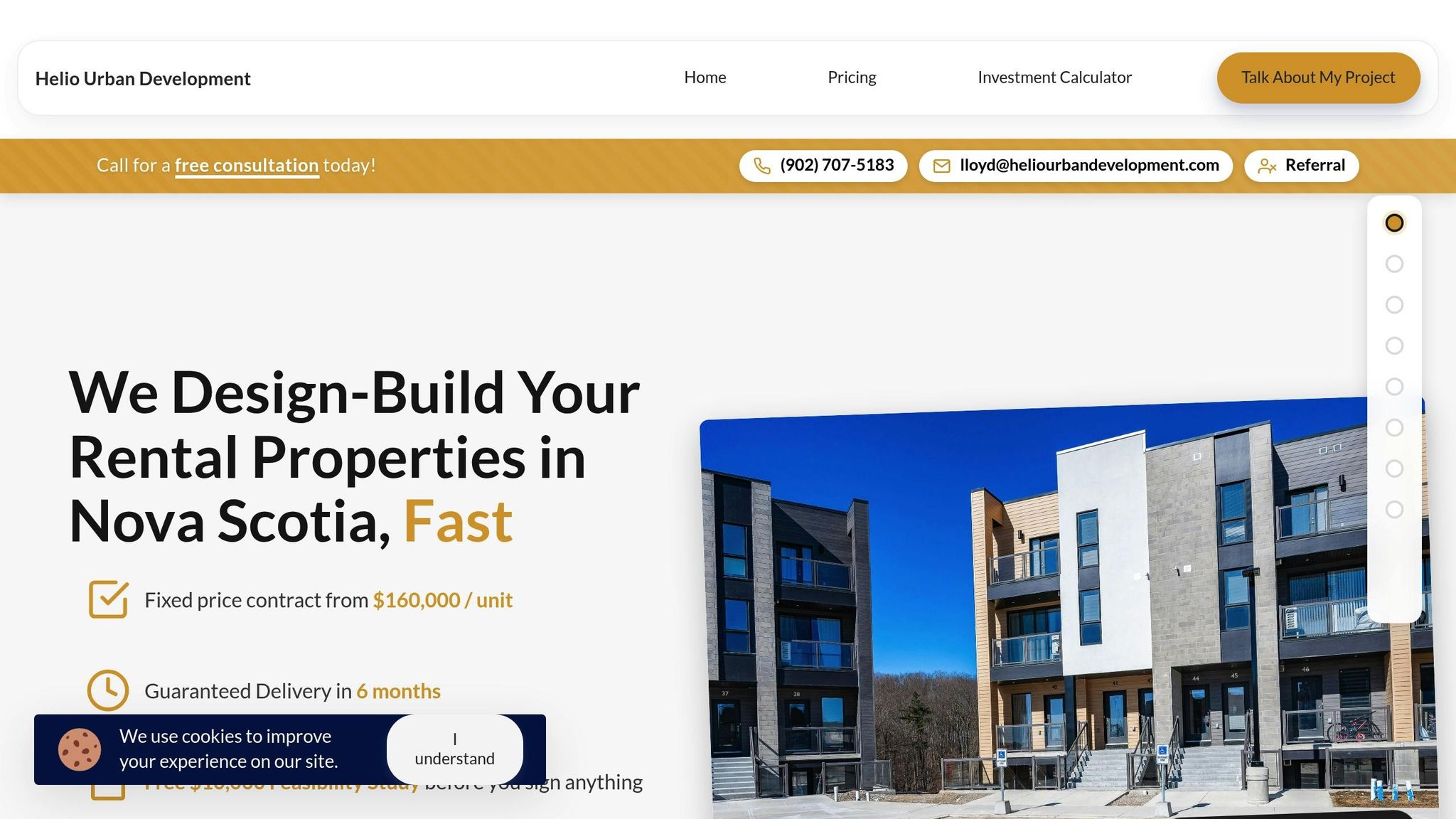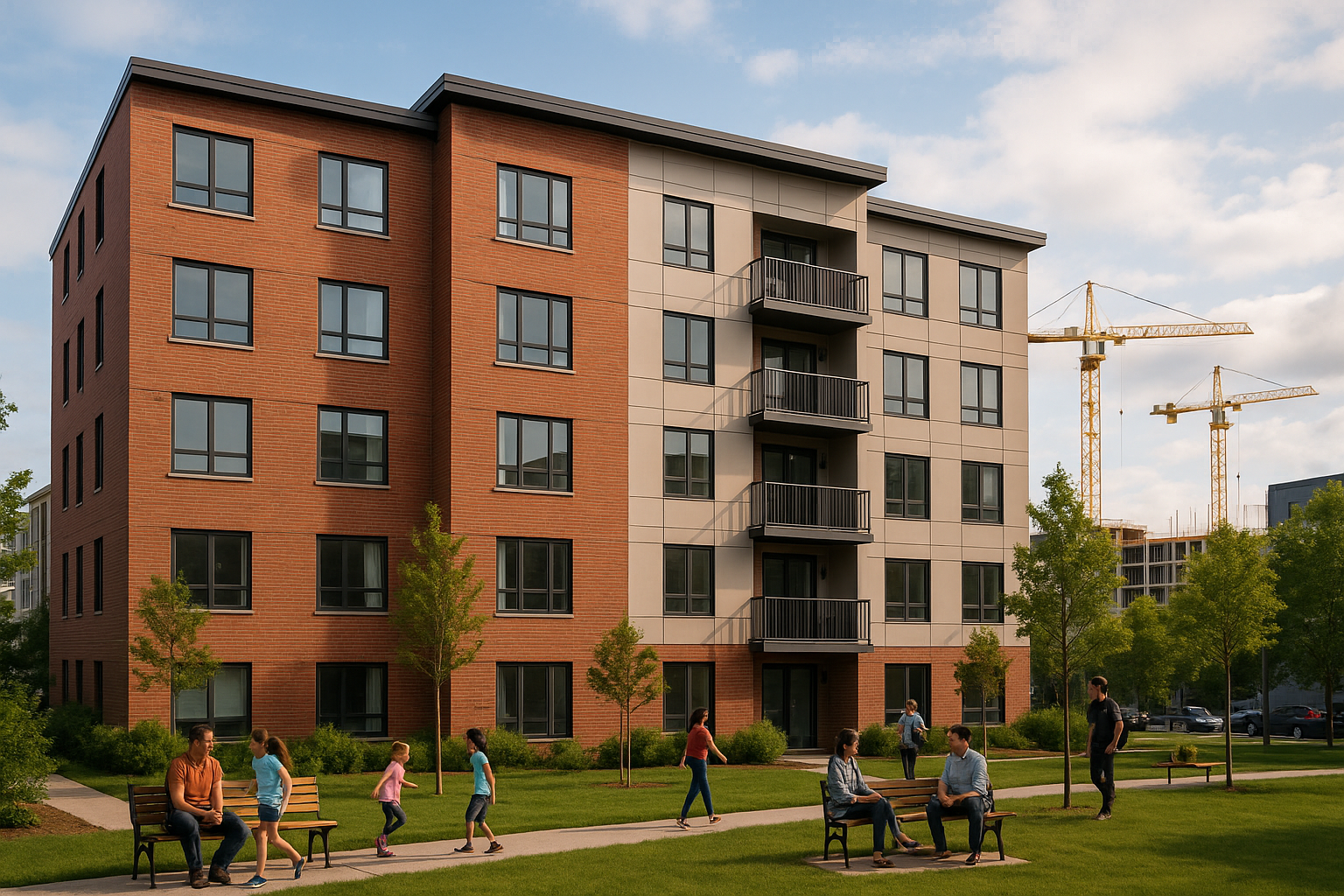Halifax Affordable Housing: Inclusionary Zoning 10% Units at 80% Market Rent
Halifax’s new inclusionary zoning (IZ) policy requires developers to dedicate 10% of units in new residential buildings to rent at 80% of market rates. For example, if the average rent is $2,400/month, these units would cost $1,920/month. This aims to integrate affordable housing into all areas of the city but creates financial challenges for developers, especially with rising construction costs.
Helio Urban Development offers a fixed-price construction model to help developers meet these requirements. With a guaranteed cost of $160,000 per unit and a six-month completion timeline, Helio ensures cost and schedule predictability. This approach reduces delays, avoids cost overruns, and makes projects more financially viable. Units built under this model can achieve a 12–20% annual return on investment, with monthly rents between $1,950 and $2,100.
Halifax's policy introduces complexities like tenant income verification, compliance reviews, and potential penalties for non-compliance. Developers can also opt to pay an in-lieu fee instead of building affordable units, but this may not always be the best financial choice.
Helio’s streamlined construction process offers an alternative for developers navigating Halifax’s evolving housing regulations, especially amid uncertainties like the recent rejection of Halifax’s 2025 Regional Plan by provincial authorities.
HALIFAX Home Owners May Have Just Won THE LOTTERY : Halifax Proposed Zoning Changes January 2024
1. Halifax Inclusionary Zoning Policy Requirements
Halifax's inclusionary zoning (IZ) policy mandates that property owners of multi-unit residential developments include affordable housing as outlined in the policy framework.
Before construction begins, property owners are required to register their development plans with the Halifax Regional Municipality. This registration must include a comprehensive rental strategy. To ensure compliance, municipal officials conduct periodic reviews to confirm that affordable housing units meet the policy's 80% rent requirement. Non-compliance can result in penalties. These processes introduce financial and operational hurdles, which will be explored further.
The policy's long-term commitments present challenges for financing and cash flow. Additionally, property owners are responsible for verifying tenant income eligibility according to local guidelines.
To navigate these obligations, some property owners consider alternative compliance options, such as paying an in-lieu fee. However, this approach comes with financial trade-offs that must be carefully evaluated.
Using an integrated project delivery approach can help stabilize construction costs and timelines, making it easier for property owners to meet regulatory requirements while maintaining profitability under the IZ policy.
2. Helio Urban Development's Fixed-Price Construction Method

Helio Urban Development has streamlined the process for multi-unit projects under Halifax's inclusionary zoning rules, eliminating the headaches that come with coordinating multiple teams. As the only design-build firm in Nova Scotia specializing in rentals with four or more units, Helio handles everything under one roof, making the entire process much smoother.
Their fixed-price model is a game-changer, offering units at $160,000 each with a guaranteed six-month completion timeline. This allows property owners to accurately calculate compliance costs upfront and decide whether to build affordable units or opt for in-lieu fees. Unlike traditional construction methods, which are often riddled with unpredictable expenses, Helio’s approach ensures cost certainty from the outset.
This level of budget predictability is critical, especially when 10% of units must rent at 80% of market rates. Traditional construction projects frequently experience budget overruns of 30–60%, cutting into the margins needed to subsidize affordable units. Helio's integrated model, on the other hand, boasts a flawless track record of $0 in cost overruns, making it easier to meet inclusionary zoning requirements without jeopardizing profitability.
Helio also ensures projects stay on schedule. Their six-month timeline, backed by penalties of up to $1,000 per day for delays, helps maintain cash flow and avoids the financial strain caused by construction delays.
But it’s not just about efficiency - Helio’s model also enhances financial viability. Property owners can expect monthly rents of $1,950–$2,100 for two-bedroom units, translating to an impressive annual return on investment (ROI) of 12–20%. Plus, with the CMHC MLI Select program, units priced at $200,000 each qualify for 95% financing with just a 5% down payment, making the financials even more attractive.
Transparency and quality are at the core of Helio’s operations. Daily photo updates, a real-time project portal, and a triple quality verification system - including P.Eng inspections and two-year warranties - ensure that affordable units are built to the same high standards as market-rate ones. This level of transparency not only meets municipal review requirements but also gives property owners peace of mind as they navigate the inclusionary zoning process.
Pros and Cons
This section compares Halifax's inclusionary zoning (IZ) policy with Helio Urban Development's fixed-price construction model.
| Aspect | Halifax Inclusionary Zoning Policy | Helio Urban Development's Fixed‑Price Method |
|---|---|---|
| Cost Predictability | Fees can vary widely, ranging from "tens of thousands to hundreds of thousands of dollars" [3] | Fixed cost of $160,000 per unit, with no risk of cost overruns [2] |
| Timeline Certainty | Delivery schedules are uncertain, often delayed due to municipal processes | Guaranteed six-month completion, with penalties of up to $1,000 per day for delays [2] |
| Profitability Impact | Below-market rent requirements can make projects "less profitable" [3] | Generates a 12–20% annual ROI, with monthly rents between $1,950 and $2,100 per unit [2] |
| Compliance Complexity | Requires navigating intricate municipal permit conditions and proportionality rules [3] | Streamlined coordination with single-point accountability [2] |
| Market Effect | Adds financial burdens to new construction [4], potentially reducing the number of units built | Encourages more construction by offering cost certainty and efficient delivery |
The table outlines the key differences, but their impact on project feasibility extends beyond these points.
Halifax's inclusionary zoning policy aims to address affordable housing needs and foster mixed-income communities. However, it introduces significant financial unpredictability. As David Deerson, lead lawyer representing Wesley Yu, bluntly states, "these inclusionary zoning policies are also frankly stupid" [3]. On the other hand, Helio's Co-Founder and CEO, Lloyd Liu, emphasizes their hands-on approach: "I personally review every quote and guarantee every timeline" [2]. This stark contrast illustrates the divide between navigating regulatory frameworks and relying on a fixed, transparent construction model.
Helio’s fixed-price model covers nearly all construction costs, excluding items like land acquisition, permit fees, demolition, utility connections, landscaping, appliances, insurance, and financing. These specifics are detailed in a complimentary $10,000 feasibility study. Additionally, projects qualify for CMHC MLI Select financing at 95% loan-to-value for units priced at $200,000 each.
Regulatory uncertainty further complicates the inclusionary zoning approach. For example, Halifax's proposed 2025 Regional Plan, which included provisions for inclusionary zoning, was rejected by the Provincial Minister of Municipal Affairs on August 8, 2025. As a result, the 2014 Regional Plan remains in effect [1]. This unpredictability highlights the appeal of Helio's systematic and transparent construction process for property owners seeking stability.
Ultimately, property owners must weigh the challenges of inclusionary zoning fees against the reliability of an integrated construction method that offers cost and timeline certainty.
sbb-itb-16b8a48
Conclusion
Halifax's inclusionary zoning policy brings a layer of unpredictability, especially when it comes to costs and regulations. This creates a pressing need for a construction model that prioritizes both efficiency and reliability. Helio Urban Development’s fixed-price construction approach offers a practical way to tackle these challenges while ensuring projects remain financially viable.
By using a vertically integrated design-build model, Helio locks in fixed costs and guarantees timelines, directly addressing common issues like coordination breakdowns and budget overruns in multi-unit projects. This streamlined method ensures stability from start to finish.
"We're a vertically integrated design-build firm delivering fixed-price housing solutions. We control design through construction, allowing optimization others can't achieve." [5]
For property owners in Halifax, this approach provides a real opportunity to meet affordable housing requirements without unnecessary complications. With a two-week design delivery timeline, Helio reduces carrying costs compared to traditional, fragmented construction processes.
In a landscape of regulatory uncertainty and municipal approval hurdles, Helio’s predictable construction process offers the consistency needed to keep projects on track. As one of their representatives explained:
"Every week of design delay costs families another month of housing. Every over-designed system breaks project economics." [5]
For Halifax property owners, the message is straightforward: focus on what you can control. Choosing an integrated design-build firm like Helio simplifies the process, meets inclusionary zoning requirements, and ensures a smoother path to both affordable housing solutions and profitable development.
FAQs
What is Halifax's inclusionary zoning policy, and how does it affect housing affordability in the city?
Halifax's Inclusionary Zoning Policy
Halifax has introduced an inclusionary zoning policy that requires 10% of units in new residential developments to be rented out at 80% of the market rent. The goal? To make housing more affordable for lower-income households while tackling the broader housing crisis. By increasing the availability of affordable housing, this policy hopes to build communities that are more inclusive and accessible.
For developers and property owners, this regulation brings both challenges and opportunities. On one hand, it may call for rethinking project budgets and designs. On the other hand, it offers a chance to actively contribute to addressing the housing crisis in a way that reflects the needs of the community. In the end, this initiative is about finding a balance between profitability and social responsibility in Halifax's housing market.
What financial factors should developers consider when deciding between building affordable units or paying the in-lieu fee under Halifax's inclusionary zoning policy?
Inclusionary Zoning Choices for Halifax Developers
Developers in Halifax are faced with a crucial choice under the inclusionary zoning policy: either include affordable housing units in their projects or pay an in-lieu fee. This decision often boils down to a comparison of costs. The fee, which typically falls between $200,000 and $380,000 per unit, varies depending on the zone.
In some scenarios, opting to pay the fee might actually be the cheaper route - particularly when the cost of building affordable units exceeds the fee amount. However, this isn’t a straightforward decision. Factors like local market trends, project budgets, and the specific fee rates set by Halifax all play a role in shaping the most cost-effective approach. Developers need to weigh these elements carefully to determine what works best for their projects.
How does Helio Urban Development ensure predictable costs and timelines for property owners using their fixed-price construction model?
Helio Urban Development offers a fixed-price construction model that ensures clear, predictable costs and timelines. For example, they set a fixed cost per unit - like $160,000 - eliminating surprises such as unexpected expenses or hidden fees. This straightforward pricing provides property owners with complete financial clarity and peace of mind.
On top of that, the model guarantees a set completion timeline, backed by penalties for any delays. This keeps projects moving forward as planned. By using this structured approach, property owners can sidestep common construction headaches while staying firmly in control of both their budget and schedule.
